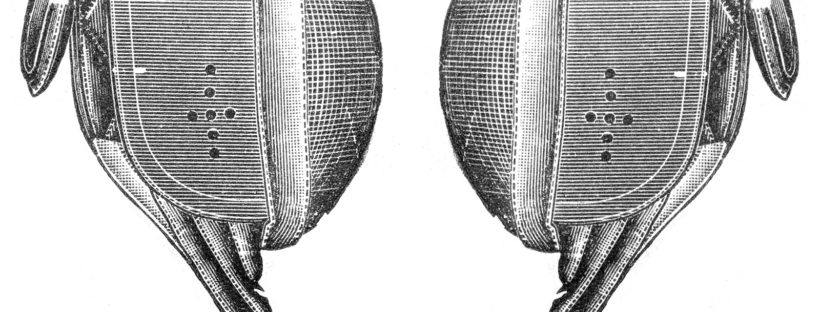It’s easy to clean a fencing mask! We’ve detailed our methods for keeping your mask in it’s best, lustrous condition. Remember that regular cleaning will make future cleanings fast and efficient.
How to Clean a Fencing Mask
Warnings: Manufacturers of fencing masks know the specifics of maintenance more than can be detailed here. Check for manufacturer cleaning instructions before considering any advice given here. It’s very important to never use bleach on fencing masks and bibs. Bleach will deteriorate the bib’s puncture resistance.
Washing: Use a large, clean bucket immerse the mask in warm water with a few capfuls of Rit Whitener & Brightener and a laundry detergent of your choice. Don’t use OxiClean as it will cause any exposed metal to instantly rust! Work the soap into the bib with a semi-hard plastic bristle brush until stains are removed. Rinse thoroughly and squeeze out as much water as possible before air drying at room temperature. It may take a day or two, depending on the climate.
Stain Removal: Really stubborn stains (like rust, coffee, or blood) can be removed safely with the same spot removing technique we use on jackets.
the Mesh
Punch Test: Use your own or your school’s punch test to guarantee the strength of the wire mesh. The mask protects your face, and you should know if it will do it’s job. Punch tests are available at many sport fencing suppliers. Test as many points on the mask as you’d like, but we recommend at least 10 spots.
Cleaning the Mesh: Most modern masks are coated in a protective plastic or paint which may scrape off with use. Any exposed mesh may rust. Use a wire brush, steel wool, or abrasive cleaning pads to remove rust. Be careful not to spread the rust onto the fabric of the mask when cleaning. Coat those exposed areas with wax or Rustoleum paint to prevent future degradation.
Prevention & Post-Use Care
Separation: Separate your fencing mask from other equipment, especially steel weapons. Transport your mask separate and isolated in a cloth bag (a pillow case is perfect). Do the same for your jacket, pants, gloves, etc to keep all your equipment clean.
Air Dry After Use: Have a dedicated space in your closet or bathroom with enough hangers to air dry all of your equipment after use. It should only take a few hours to dry and will keep your clothes from growing mildew.
Special Techniques
Rust: Spot clean a fencing mask with the recipe we use on jackets.
Sweat Stains: Ivory soap has been around since 1879 and is a fine product. It’s incredibly good at dissolving natural oils making it useful to remove sweat stains & body odor. If you have some particularly tough stains on the mask’s bib, try hand-scrubbing with Ivory soap.
Odors: Arm & Hammer Baking Soda (sodium bicarbonate) shouldn’t only be found in your refrigerator or cupboard. Add a cup of baking soda when soaking the mask to balance the pH of the water to make your detergent more effective and help remove odors.
Blood: Take extreme care with blood, even your own! Be considerate of the possible biological contagion blood presents (which is probably minimal), but more so people’s psychological fears of it. Spot clean a fencing mask as quickly as possible and properly dispose of any cleaning materials containing blood.
